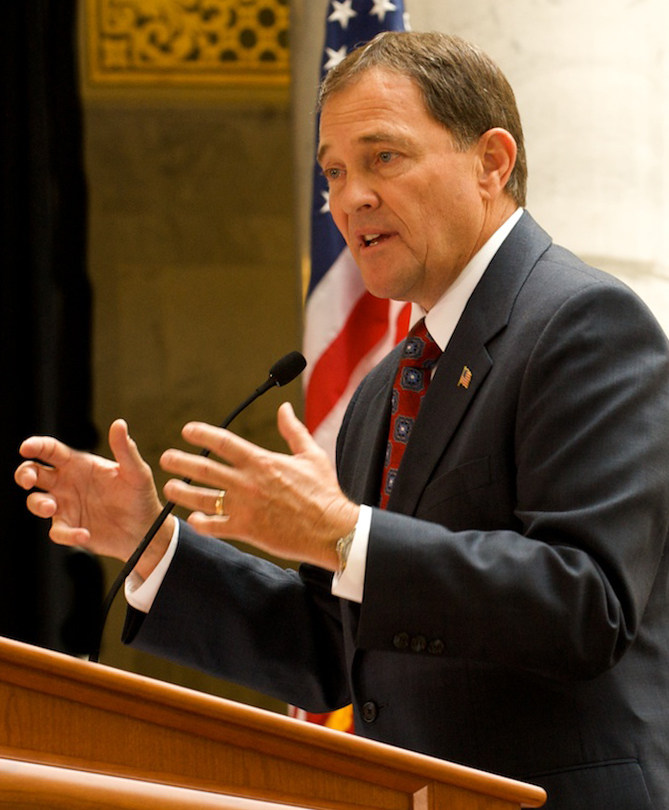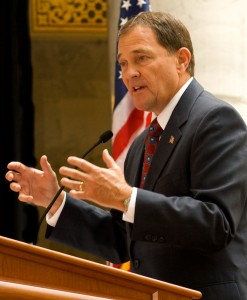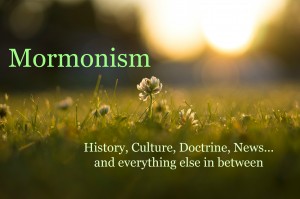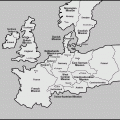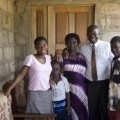I read recently that a group of atheists chose Salt Lake City, Utah, for their Easter weekend convention. Salt Lake City, of course, is the headquarters for The Church of Jesus Christ of Latter-day Saints, whose members are sometimes referred to as Mormons. With about sixty percent of those in the city calling themselves Mormons, they constitute a majority and the legislators they choose tend to be Mormon as well.
While the Church, as is common, declined to comment on what the members of this organization said about Mormons, individual Mormons have spoken out, disagreeing with the claims made by the group.
The atheists feel that if the majority (a small majority today) of residents are Mormon and the majority of legislators are Mormon, that must mean the Church is running the city. As many have pointed out, the Church, unlike many other churches, does not tell its members who to vote for or which party to join. There have been Mormon prophets who belonged to both major political parties and there are Mormon leaders today on both sides of the political fence, as well as those who choose to remain independent when not voting in a Primary election.
I live in a predominately Catholic area. Most politicians and leaders are Catholic. Each morning, my street is filled with Catholic school busses picking up children. When something important is happening in the Catholic faith, it will be the leading story in our news broadcasts and print newspapers. When Catholic schools were being closed, all programming was interrupted to reveal the names of the impacted schools. Before moving here, I lived in a predominately Jewish area. The public library was closed on all major Jewish holidays, requiring me to put them on my calendar so I’d remember.
When I moved into these areas, I understood that I would be living in an area where most people shared a common faith that I did not share with them. I believe that when doing so, a person should be prepared to accept that and to embrace it, in the same way that moving to a new country requires you to accept that the country will have its own culture and priorities. That doesn’t mean I felt a need to convert or to adopt their standards and beliefs. It simply means that I find the good that comes from it, make an effort to learn more about the faith of my neighbors and to look for what I can admire. I don’t feel discriminated against because I am not of that faith, even though I’m not part of their social network at church. I don’t resent that the library might be closed on a holiday I don’t happen to celebrate.
I don’t find discrimination in the closing of the libraries or even the religious membership of the politicians. The reason we vote for politicians locally is so that we can have leaders who represent the cultural and moral beliefs of the majority of the people. The Catholics are the majority here, so the leaders tend to represent those values. I am comfortable with that, but if I were not, I would either live elsewhere or celebrate that our system of government works.
I can’t picture a group of Mormons coming to the Philadelphia area to protest the Catholic influence here. We just don’t do things like that because it is disrespectful. Mormons teach that freedom of religion is critical and that we must respect the religions of other people. We would especially not show up during their most sacred holiday. We wouldn’t hold an event to help people leave their faith en masse. Our missionary work tends to be very individualized.
So, what did the Mormons in Utah do about this convention? Interestingly enough, they accepted an invitation to a discussion between the two groups, which included the head of the atheist group, who is a former Mormon, and two professors at Church-owned Brigham Young University. They didn’t make it a debate, which would require a winner and loser. Instead, they used the opportunity to simply discuss common concerns and misconceptions. Individual Mormons, not sent by the Church, countered a protest by merely gathering to sing hymns nearby. There was no violence and nothing, in fact, happened that was interesting enough to make media headlines. Mormons are pretty relaxed about things like this. They might get a little tired of being a target for these types of meetings, but they are taught to respond with love.
Nearly 25 years ago, the First Presidency declared: “Our message … is one of special love and concern for the eternal welfare of all men and women, regardless of religious belief, race, or nationality, knowing that we are truly brothers and sisters because we are sons and daughters of the same Eternal Father” (First Presidency statement, 15 Feb. 1978).
That is our doctrine—a doctrine of inclusion. That is what we believe. That is what we have been taught. Of all people on this earth, we should be the most loving, the kindest, and the most tolerant because of that doctrine (M. Russell Ballard, Doctrine of Inclusion, General Conference of The Church of Jesus Christ of Latter-day Saints, October 2001).
About Terrie Lynn Bittner
The late Terrie Lynn Bittner—beloved wife, mother, grandmother, and friend—was the author of two homeschooling books and numerous articles, including several that appeared in Latter-day Saint magazines. She became a member of the Church at the age of 17 and began sharing her faith online in 1992.

